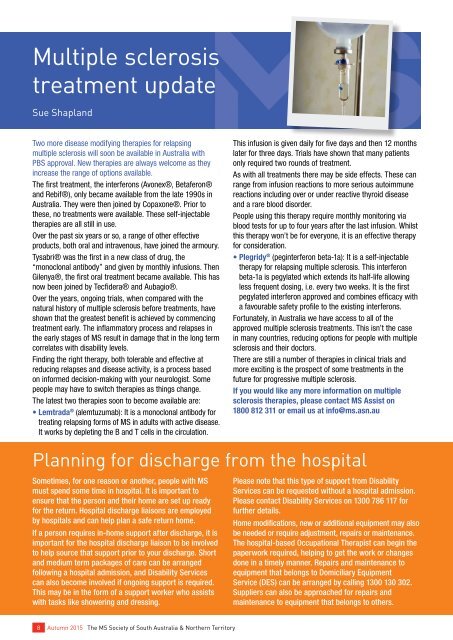MSSANT Network Autumn 15 WEB
Create successful ePaper yourself
Turn your PDF publications into a flip-book with our unique Google optimized e-Paper software.
Multiple sclerosis<br />
treatment update<br />
Sue Shapland<br />
Two more disease modifying therapies for relapsing<br />
multiple sclerosis will soon be available in Australia with<br />
PBS approval. New therapies are always welcome as they<br />
increase the range of options available.<br />
The first treatment, the interferons (Avonex®, Betaferon®<br />
and Rebif®), only became available from the late 1990s in<br />
Australia. They were then joined by Copaxone®. Prior to<br />
these, no treatments were available. These self-injectable<br />
therapies are all still in use.<br />
Over the past six years or so, a range of other effective<br />
products, both oral and intravenous, have joined the armoury.<br />
Tysabri® was the first in a new class of drug, the<br />
“monoclonal antibody” and given by monthly infusions. Then<br />
Gilenya®, the first oral treatment became available. This has<br />
now been joined by Tecfidera® and Aubagio®.<br />
Over the years, ongoing trials, when compared with the<br />
natural history of multiple sclerosis before treatments, have<br />
shown that the greatest benefit is achieved by commencing<br />
treatment early. The inflammatory process and relapses in<br />
the early stages of MS result in damage that in the long term<br />
correlates with disability levels.<br />
Finding the right therapy, both tolerable and effective at<br />
reducing relapses and disease activity, is a process based<br />
on informed decision-making with your neurologist. Some<br />
people may have to switch therapies as things change.<br />
The latest two therapies soon to become available are:<br />
• Lemtrada ® (alemtuzumab): It is a monoclonal antibody for<br />
treating relapsing forms of MS in adults with active disease.<br />
It works by depleting the B and T cells in the circulation.<br />
This infusion is given daily for five days and then 12 months<br />
later for three days. Trials have shown that many patients<br />
only required two rounds of treatment.<br />
As with all treatments there may be side effects. These can<br />
range from infusion reactions to more serious autoimmune<br />
reactions including over or under reactive thyroid disease<br />
and a rare blood disorder.<br />
People using this therapy require monthly monitoring via<br />
blood tests for up to four years after the last infusion. Whilst<br />
this therapy won’t be for everyone, it is an effective therapy<br />
for consideration.<br />
• Plegridy ® (peginterferon beta-1a): It is a self-injectable<br />
therapy for relapsing multiple sclerosis. This interferon<br />
beta-1a is pegylated which extends its half-life allowing<br />
less frequent dosing, i.e. every two weeks. It is the first<br />
pegylated interferon approved and combines efficacy with<br />
a favourable safety profile to the existing interferons.<br />
Fortunately, in Australia we have access to all of the<br />
approved multiple sclerosis treatments. This isn’t the case<br />
in many countries, reducing options for people with multiple<br />
sclerosis and their doctors.<br />
There are still a number of therapies in clinical trials and<br />
more exciting is the prospect of some treatments in the<br />
future for progressive multiple sclerosis.<br />
If you would like any more information on multiple<br />
sclerosis therapies, please contact MS Assist on<br />
1800 812 311 or email us at info@ms.asn.au<br />
Planning for discharge from the hospital<br />
Sometimes, for one reason or another, people with MS<br />
must spend some time in hospital. It is important to<br />
ensure that the person and their home are set up ready<br />
for the return. Hospital discharge liaisons are employed<br />
by hospitals and can help plan a safe return home.<br />
If a person requires in-home support after discharge, it is<br />
important for the hospital discharge liaison to be involved<br />
to help source that support prior to your discharge. Short<br />
and medium term packages of care can be arranged<br />
following a hospital admission, and Disability Services<br />
can also become involved if ongoing support is required.<br />
This may be in the form of a support worker who assists<br />
with tasks like showering and dressing.<br />
Please note that this type of support from Disability<br />
Services can be requested without a hospital admission.<br />
Please contact Disability Services on 1300 786 117 for<br />
further details.<br />
Home modifications, new or additional equipment may also<br />
be needed or require adjustment, repairs or maintenance.<br />
The hospital-based Occupational Therapist can begin the<br />
paperwork required, helping to get the work or changes<br />
done in a timely manner. Repairs and maintenance to<br />
equipment that belongs to Domiciliary Equipment<br />
Service (DES) can be arranged by calling 1300 130 302.<br />
Suppliers can also be approached for repairs and<br />
maintenance to equipment that belongs to others.<br />
8<br />
<strong>Autumn</strong> 20<strong>15</strong> The MS Society of South Australia & Northern Territory


















